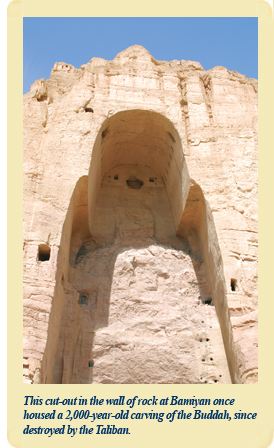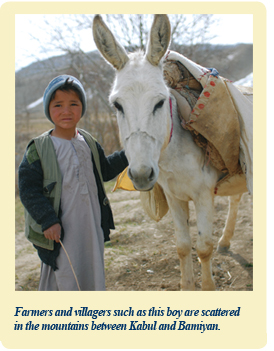

A Passage to Afghanistan
continuedThe American travelers then headed for Bamiyan, which is the famous site of two, 2,000-year-old Buddha statues that were destroyed by the Taliban in 2001. The dirt road to Bamiyan was described by Petrosemolo as a pot-holed, narrow construction road with no guardrails on the steep mountain passes. “It was a very rough nine-hour ride.”
Along the way, he said, “We saw lots of destroyed Russian tanks and military vehicles along the road as well as hundreds of green flags marking the spots where fighters in the Northern Alliance died fighting Taliban forces.”
Petrosemolo stayed at a hotel in Bamiyan. “Electricity goes off at 10 p.m. and there is running water sometimes, hot water occasionally.”
McCurry did location work for a National Geographic story in Bamiyan and focused on the cottage industry of carpet making in the city. He also researched Buzkashi, a fierce, polo-type game played on horseback without sticks and using a dead calf specially prepared to serve as a ball. This game has been played in Afghanistan since the days of Genghis Khan in the 13th century. Banned by the Taliban, the game is seeing a resurgence since the regime change.
From Bamiyan, Petrosemolo said, “We drove five kilometers into the mountains where we, surprisingly, found small communities of Afghan farmers. “I was able to take dozens and dozens of photos of children and adults, many of whom have never had their picture taken and who got a big kick out of seeing their image on the digital camera screen.”
And one afternoon, Petrosemolo focused his lens on McCurry in action to paint a portrait of the photographer at work for the upcoming U.N. exhibit.


After nearly a week traveling with McCurry, Petrosemolo left the artist to return home. He had arrangements made with another guide, and he met his driver quietly at the edge of the city, because he was warned that in Afghanistan “it is best not to let anyone know your plans.”
After more bone-jarring travel along the rough terrain, and after passing the customary roadblocks set up by the local villages and the Afghan Army, Petrosemolo arrived in Kabul for his flight back to Dubai.
He recalled, “Since there are no computers and everything is done manually, checking in to pay the departure tax and getting a boarding pass all take time. Although the flight was scheduled to depart at 3:30 p.m., time is relative in Kabul, and it wasn’t until nearly 6:45 p.m. that the flight was called. As with the flight into Kabul, the aged 727, a gift from Indian Air, had broken seats, no seat belts … but the male attendants again served a hot meal. The plane was full and many were Afghan residents returning to Dubai to work, as there are limited job opportunities in Kabul.”
After arriving in Dubai, Petrosemolo and Ann Jones, author of Kabul in Winter, whom he met on the plane, spent an hour touring the city. “I was looking at the fantastic new hotels in Dubai and couldn’t believe the contrast to Kabul. … Just two hours away by plane but at least two generations ahead in development.”
The next day, he was back at FDU, greeting people with a new look — a beard had emerged — and a new outlook.
“My adventure ended, but the memories of Afghanistan and its people, especially the children, will remain forever. I do my best to explain to colleagues what Afghanistan is like today and the fact that, deep down, I feel it will be years before the economy returns and it is a safe place to visit. But I am not sure many people can really understand, unless they too see first-hand, even for a week, the hardships endured by the Afghan people.”
FDU Magazine Home | Table of Contents | FDU Home | Alumni Home | Comments
©Copyright 2006 Fairleigh Dickinson University. All rights reserved.
For a print copy of FDU Magazine, featuring this and other stories, contact Rebecca Maxon, editor,
201-692-7024 or maxon@fdu.edu.
